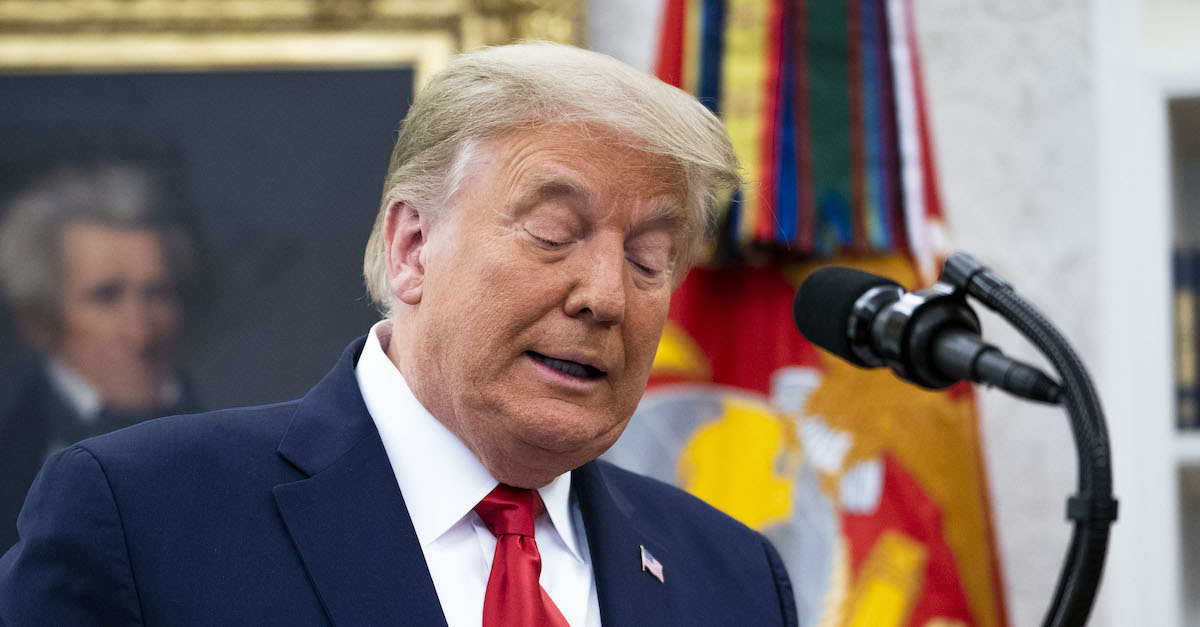
President Donald Trump pressured Georgia’s top election investigator to come up with evidence of voter fraud, telling him that such a finding would make him a “national hero” in a second phone call that legal experts say could leave the president open to criminal charges, The Washington Post reported Saturday.
An individual familiar with the call told The Post that Trump called the investigations chief for the Georgia Secretary of State’s office in late December. That chief was leading an ongoing investigation into allegations of voter fraud in Cobb County at the time. Trump implored him to “find the fraud” in the state’s election results, the individual told the Post.
Local station WXIA-TV in Atlanta confirmed the reporting.
The call is the third reported conversation during which Trump sought to have Georgia state officials overturn the results of the 2020 election.
The president recently came under fire earlier this month for calling Georgia Secretary of State Brad Raffensperger and falsely insisting that he won the 2020 election. During the call, Trump threatened Raffensperger and his office’s general counsel with possible criminal penalties unless they were able to “find” 11,780 votes—one more than he would need to defeat President-elect Joe Biden in the Peach State. Raffensperger recorded the jaw-dropping call and released it after the president repeatedly lied about what had been discussed.
Law&Crime legal analyst and attorney Elura Nanos previously published an exhaustive legal analysis listing all the possible crimes that may have been committed during Trump’s conversation with Raffensperger, including solicitation and conspiracy to commit voter fraud.
Raffensperger on Friday confirmed to The Post that Trump did in fact place the nearly hour-long phone call on Dec. 23. While he conceded that he was “unfamiliar” with the specifics discussed on the call, Raffensperger said the attempt to intervene was not appropriate.
“That was an ongoing investigation,” Raffensperger told the outlet. “I don’t believe that an elected official should be involved in that process.”
Based on a description of the call, former assistant U.S. attorney and member of the Watergate prosecution team Nick Akerman told The Post that he would be “shocked” if Trump’s conduct didn’t constitute a crime under Georgia’s criminal code.
“Oh my god, of course that’s obstruction—any way you cut it,” he said, noting that identifying and contacting the investigator showed he was trying to “influence” the final outcome.
New York-based attorney Andrew Fleischman additionally pointed out that even a controversial self-pardon may not help Trump avoid an investigation if Trump is prosecuted for a state crime.
“If the investigator is considered law enforcement or a member of the court, that’s a much stronger case for a state level crime, since intimidation qualifies,” he wrote.
“And if the call went to the man’s office in Fulton County, then progressive DA Fani Willis will choose whether to investigate.”
The newly elected Willis hasn’t wasted any time taking over the prosecutor’s office, already vowing to impartially investigate Trump’s call to Raffensperger should the case be referred to her by the state’s election board.
“As I promised Fulton County voters last year, as District Attorney, I will enforce the law without fear or favor. Anyone who commits a felony violation of Georgia law in my jurisdiction will be held accountable,” she said last week. “Once the investigation is complete, this matter, like all matters, will be handled by our office based on the facts and the law.”
[image via Doug Mills-Pool/Getty Images]